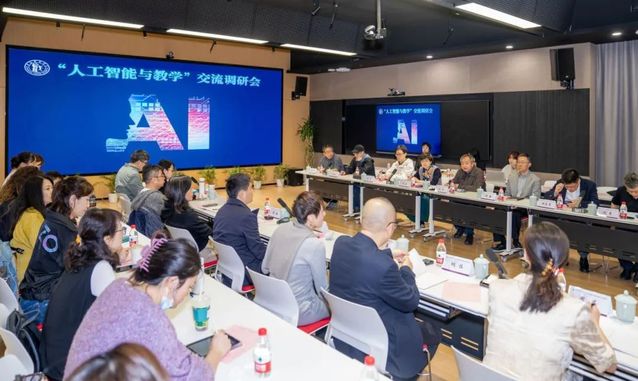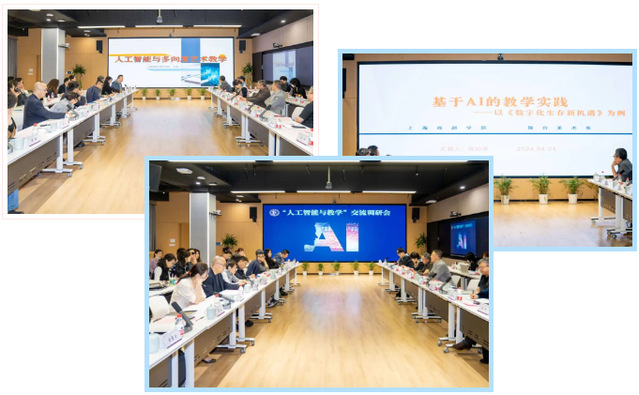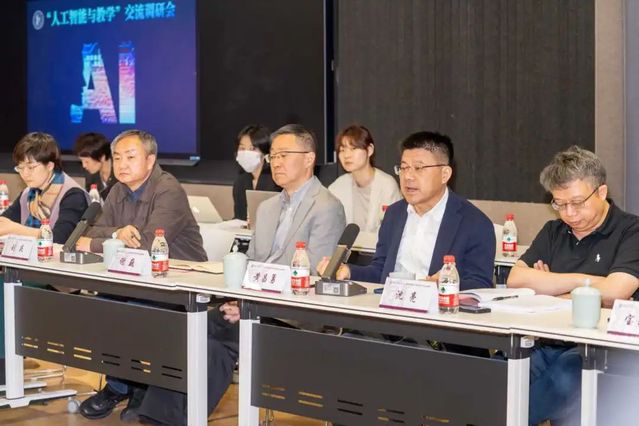In today's society, where there is a continuous focus on new productive forces, the discussion on the ecosystem of higher art education institutions against the backdrop of "artificial intelligence" has also been put on the agenda.
Recently, the Shanghai Theatre Academy convened a meeting focusing on "Artificial Intelligence and Teaching". The meeting was attended by the heads of the Academic Affairs Office, Development Planning Office and various colleges, departments and schools, the program directors, and the teacher representatives for discussions and exchanges. The meeting was chaired by Vice President, Liu Qing.

Deputy Party Secretary and President Huang Changyong stated that higher education cannot avoid the major trend of technological development. It is essential to transform traditional concepts, embrace new technologies actively, and pay special attention to artificial intelligence. We should be adept at observing and learning, thinking about and implementing how to integrate AI into teaching. At the same time, we must strengthen faculty quality to meet the challenges of curriculum transformations. The university will make plans in terms of its curriculum setup and faculty cultivation, and accelerate the establishment of courses related to artificial intelligence, thus laying a solid foundation for cultivating talents for the new era.
The Academic Affairs Office and the Development Planning Office have conducted research on the application of artificial intelligence in various disciplines. While presenting the findings of the research, they made suggestions on how to build more artificial intelligence teaching scenarios for the future, and to meet the talent demands of industries in the future.
The teacher representatives at the meeting shared their teaching practices in various stages, demonstrating how they incorporate artificial intelligence to assist in the teaching of specialty courses. This included using AIGC software to establish learning plans and conduct cognitive training, offer creative ideas, control production, bring in virtual teaching assistants and facilitate personalized teaching. They expressed their commitment to further promote the application of artificial intelligence in the teaching of specialty courses.

The heads of various colleges, departments and schools engaged in an in-depth discussion on the current application and future prospects of artificial intelligence in the teaching of specialty courses and within the industry. They emphasized the need to focus on and rationally analyze the impacts and challenges brought by artificial intelligence, and to deepen new explorations and create new strengths in art education going forward.
Party Committee Secretary Xie Wei summarized the theme of this meeting from the perspectives of discipline construction, education and teaching, and talent cultivation. Xie Wei emphasized that in terms of discipline construction, we should create the future-oriented theater studies, strengthen the construction of theatrical theory, focus on the integration of theory and practice, seize opportunities to become the first to create and the first to launch, thereby gaining the voice of authority; in terms of talent cultivation, we should adhere to the three-step path that progresses sequentially through doctoral, master's and bachelor’s programs", and "push for optimization of the existing capacity through incremental adjustments"; in terms of education and teaching, emphasis should be placed on implementation to further enhance the role of artificial intelligence in teaching. We should adopt an "encourage exposure and be tolerant in uses" attitude towards artificial intelligence, and find application scenarios according to the actual situations of each specialty. In addition, it's important to focus on summarizing and refining, to quickly form demonstrative and symbolic results, strengthen the professional development of teachers, and create an artificial intelligence large model for performance arts that is nationally influential.

With the advancement of artificial intelligence technology, art education will embrace a broader scope for development and limitless possibilities. The Shanghai Theatre Academy will also continue to closely follow the progress and application of artificial intelligence, and constantly explore more potential uses in teaching, thus injecting new vitality into art education.



